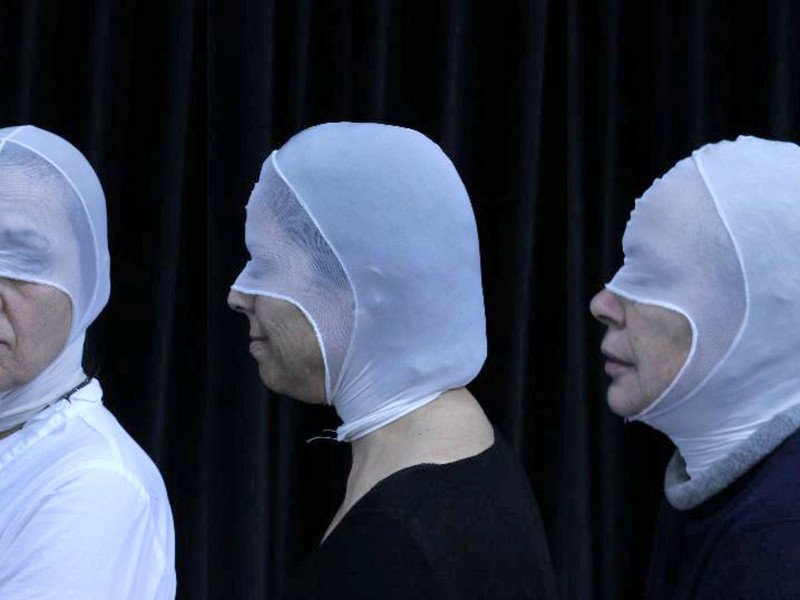|
Concept, Writing and Directing: Ofira Henig
International Project -
Chapter Two
Concept, Writing and Directing: Ofira Henig
Visual concept: Amit Drori
Costumes: Anny Atedgy yalin
Sound: Ido Manor
Light: Rafi Ovadia
Actors: Rivka Neumann, Salwa Nakkara, Almut Zilcher Gotscheff, Tjark Bernau
Translation from Hebrew to German:
Adina Stern
Translation from English to Hebrew:
Shimon Bouzaglo
Translation from Hebrew to Arabic:
Salwa Nakkara
Translation documents from German:
Hanan Elstein
Translation testimony to German:
Lukas Zchech
Production: as-is-arts.com
With the support of Goethe Institut-TLV, Lilach (TLV)
|
View Images
|
Three Dog Night is a term that is believed to have originated from either the Eskimo community or the Australian Aboriginal. It is commonly used to describe a very cold night. It is said on very cold nights, the Eskimos would sleep with dogs in their Igloos to keep warm because the body temperatures of the dogs were much higher than human body temperatures. .
A story about three women, one absent man and one actor.
Three women from three different cultures, speaking three languages - all meet at the bedside of a dying man. Through coping with the sickness, in the ways presented by the women, the issue of “Mercy Killing” is raised: the freedom to choose such an act, its legitimacy, the social risk that comes with it, the definition of the terms “Mercy Killing” and “Euthanasia”, and their legal and public implications within a particularly sensitive context: The history context of the T4 "Euthanasia". But the most interesting context, is our present context: Choosing the act of "Mercy Killing" in a bleeding country that addicted to the death.
“For many years I have been moving between Europe and Israel, the west and the Middle East, and between the personal and the political. In the last two years I have been mainly examining the issue of the artist’s position within a cultural and political context (see Yes, Stand Out of my Sunlight! 2012), and this time I’m engaged with the subject of the individual’s personal choice within their cultural and historical conditions.
As eager as we are to escape limiting definitions of identities, the harder we kick expectations set for us, the further away we wish to get from prejudices - comes the politics and swallows us whole, the history reappears and dictates our biography." Ofira Henig
At the end of the 19th century and the beginning of the 20th, many studies began to emerge, mostly in Germany and the United-States, examining the subject of “worthless life”.
These studies were engaged in developing steps towards an improved texture of modern society, and included professionals in the fields of science, medicine, anthropology, education, social-work, engineering, criminology and so on. The studies expanded the discussion regarding individuals who were marked as unproductive and perceived as an economical, social and personal burden upon their families, the society and state institutions.
In 1920, Karl Binding (Germany) has focused on the fate of those women and men whose lives were regarded as worthless, through the concept of negative Lebensunwert (“life without value”), a definition that includes the life of those who suffer physical pain and disability, but also those who are considered to be inferior and whose lives are perceived as of no value. Binding has presented the argument according to which terminally ill patients hold the right for a painless death, in order to validate the murder of those deemed inferior. Binding and his supporters who made further use of his claim, deliberately blurred the boundaries of the discussion, pointed out the right of terminally ill patients to voluntarily end their lives, when in fact they sought to eliminate those “unworthy” lives of healthy yet “degenerated” individuals.
These studies formed the grounds for future mass killings under the Nazi regime, during which a quarter of a million sick, handicapped and mentally ill German citizens were killed.
When the atrocities of the Nazi regime were revealed to their full scope, the studies on the subject in the USA have been silenced and faded out.
"It is a journey. When I begun the process of research and writing, I was a weak person. I Lost my beloved father and felt that I lost my protest. I was influenced by the presence of his death. But then the war began. I was confronting with the issue of the Shock moments. All levels got a new perspective. The journey has just started". Ofira Henig
|

